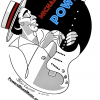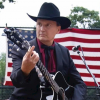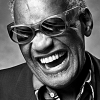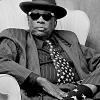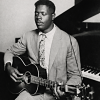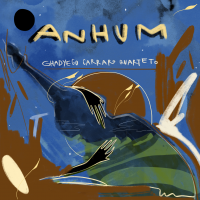Home » Jazz Musicians » Muddy Waters
Muddy Waters
Waters was born McKinley Morganfield in Issaquena County, Mississippi in 1913 (He later told people that he was born in 1915 in Rolling Fork, Mississippi; the reason for this remains unknown). His grandmother Della Grant raised him after his mother died in 1918. His fondness for playing in mud earned him his nickname at an early age. Waters started out on harmonica but by age seventeen he was playing the guitar at parties and "fish fries", emulating two blues artists who were extremely popular in the south, Son House and Robert Johnson. "His thick heavy tone, the dark coloration of his voice and his firm almost stolid manner were all clearly derived from House," wrote Peter Guralnick in Feel Like Going Home, "but the embellishments which he added, the imaginative slide technique and more agile rhythms, were closer to Johnson."
In 1940 Waters moved to St. Louis before playing with Silas Green a year later and returning back to Mississippi. In the early part of the decade he ran a juke house, complete with gambling, moonshine, a jukebox and live music courtesy of Muddy himself. In the Summer of 1941 Alan Lomax came to Stovall, Mississippi, on behalf of the Library of Congress to record various country blues musicians. "He brought his stuff down and recorded me right in my house," Waters recalled in Rolling Stone, "and when he played back the first song I sounded just like anybody's records. Man, you don't know how I felt that Saturday afternoon when I heard that voice and it was my own voice. Later on he sent me two copies of the pressing and a check for twenty bucks, and I carried that record up to the corner and put it on the jukebox. Just played it and played it and said, `I can do it, I can do it.'" Lomax came back again in July of 1942 to record Waters again. Both sessions were eventually released as Down On Stovall's Plantation on the Testament label.
In 1943 Waters headed north to Chicago in hopes of becoming a full-time professional. He lived with a relative for a short period while driving a truck and working in a factory by day and playing at night. Big Bill Broonzy was the leading bluesman in Chicago until his death in 1958 and the city was a very competitive market for a newcomer to become established. Broonzy helped Waters out by letting him open Broonzy's show in the rowdy clubs. In 1945 Waters's uncle gave him his first electric guitar, which enabled him to be heard above the noisy crowds. In 1946 Waters recorded some tunes for Mayo Williams at Columbia but they were never released. Later that year he began recording for Aristocrat, a newly- formed label run by two brothers, Leonard Chess and Phil Chess. In 1947 Waters played guitar with Sunnyland Slim on piano on the cuts "Gypsy Woman" and "Little Anna Mae." These were also shelved, but in 1948 Waters's "I Can't Be Satisfied" and "I Feel Like Going Home" became big and his popularity in clubs began to take off. Soon after, Aristocrat changed their name to Chess and Waters's signature tune, "Rollin' Stone", became a smash hit.
Read moreTags
Muddy Waters / Johnny Winter / James Cotton: Breakin' It Up, Breakin' It Down

by Doug Collette
The partnership of guitarists/vocalists Johnny Winter and Muddy Waters in the late-seventies was a collaboration in the truest sense of the word. The success and recognition that arose from their teamwork-- Hard Again (Blue Sky, 1977) and I'm Ready (Blue Sky, 1978), which both won Grammys-- inspired them to take to the road. Winter and Waters invited the redoubtable James Cotton, blues harpist extraordinaire, to join them, and a recently exhumed recording of a live performance fronted by this illustrious ...
Continue ReadingMuddy Waters

by Peter Madsen
Muddy Waters! Muddy Waters! Muddy Waters!
Damn this man could sing and play the blues. Lately I've been listening to his very first recording done for the Library of Congress in 1941 in the fields of the Mississippi Delta. Absolutely some of the finest music ever!!
Beginning in 1933 music researcher and historian Alan Lomax was working for the Library of Congress traveling throughout the Southern United States making field recordings of American traditional music with ...
Continue ReadingBlues

by Ed Kopp
The blues is the progenitor of most popular music in America, but it hasn't always gotten the respect it deserves. The recorded history of the blues proves the point. Prior to World War II, very few white people had ever heard any authentic blues music. Up until the late 1950s, blues labels could only afford to record and market singles, never albums. Even today the blues is widely regarded as the old-fashioned cousin of jazz, rock and rap, when it ...
Continue ReadingMuddy Waters: Streamlined Woman

by Al Rearick
Trust the British to go and dig up as much blues roots as possible. The blues as a music form was born in the states with folks like Robert Johnson, Son House and Muddy Waters. It was a blend of art culture that trickled into American interest, but, like so many other artforms, soon faded into near obscurity. With bands like the Rolling Stones, the Yardbirds, Mayall's Bluesbreakers and Led Zeppelin, we can thank the Motherland for keeping the blues ...
Continue ReadingThat Time Keith Richards Discovered Muddy Waters Painting The Ceiling Of Chess Studios

Source:
HypeBot
Host to countless legendary artists, Chess Records has become an iconic fixture of reverence in the music industry, so it should come as no surprise that some of music's biggest icons would cross paths in unexpected ways there, as in this peculiar interior decorating incident involving Muddy Waters and The Rolling Stones. Guest post by Dan Reifsnyder of Soundfly's Flypaper To simply call Chess Records “legendary” would be a gross understatement. Founded in Chicago in 1950, it was the label home to ...
read more
"MUDDY" - A Picture Book about Muddy Watters is now available from Simon & Schuster

Source:
All About Jazz
The words and pictures here mix exuberance with melancholy. Mahin’s words have a beat all their own, capturing the lows and highs with poetic verve. Turk’s watercolor, ink, and collage artwork fills pages, exploding with a neon intensity—the equivalent of a dynamic guitar riff... Read the book, then get kids the music.”—Booklist, starred review “Turk’s breathtaking pictures fuse historical newspaper clippings, paint, printer’s ink, oil pastels, and china marker. His symbolic palette shifts from sun-seared, white-gold cotton, red earth, and ...
read more
Candye Kane, Fabulous Thunderbirds, Muddy Waters Tribute Headline Simi Valley Cajun & Blues Festival, May 26-27

Source:
conqueroo
Los Angeles area's largest Cajun and Blues festival, held over Memorial Day weekend, features two stages, a Mardi Gras parade, kids' stages, crafts and dozens of food booths SIMI VALLEY, Calif.—The 23rd annual Simi Valley Cajun & Blues Festival will rock over Memorial Day weekend, May 26-27, at Rancho Santa Susanna Community Park, 5005 Los Angeles Ave., in Simi Valley. The festival features two full stages for each of its musical genres. Music will proceed non-stop each day from 12 ...
read more
Muddy Waters - Electric Mud (Cadet/Chess, 1968)

Source:
Music and More by Tim Niland
Released under the direction of the young second generation Chess Records producer Marshall Chess on the Cadet imprint, this album was designed to help the great bluesman Muddy Waters connect with the young, white audiences that were flocking to the psychedelic ballrooms like the Fillmore and Winterland in the late 1960's. Apparently is was a successful venture, purportedly selling in the neighborhood of 150,000 copies. Whom it was not popular with was the blues cognoscenti of the era. They found ...
read more
Mud Morganfield (Eldest Son of Muddy Waters) Announces November UK Dates

Source:
Just Roots PR
With the Dirty Aces featuring Giles Robson on Harp From the latest “Blues in Britain Magazine": Mud was then introduced in fine style, to take centre stage and just blow the audience away with his superb vocals and engaging manner. After instructing the band to “take their time," his rendition of “King Bee" and “You Can't Lose What You Never Had" was so similar to his father's vocal style and energy that it was downright spooky, in the most enjoyable ...
read more
New Release from Newport Jazz 1960 - Afternoon Blues Featuring Muddy Waters

Source:
Wolfgang's Vault
Just released, from the Wolfgang's Vault collection of Newport Jazz 1960 - an afternoon of Blues that might have been the end for Newport Jazz. The performances recorded and digitized for your free streaming or download pleasure include several notable moments by: Langston Hughes - narrator Muddy Waters - guitar, vocals Otis Spann - piano Tal Harris - guitar Andrew Stevens - bass James Cotton - harmonica Francis ...
read more
Jazz Musician of the Day: Muddy Waters

Source:
Michael Ricci
All About Jazz is celebrating Muddy Waters' birthday today!
JAZZ MUSICIAN OF THE DAY Muddy Waters
Early life Waters was born McKinley Morganfield in Issaquena County, Mississippi in 1913 (He later told people that he was born in 1915 in Rolling Fork, Mississippi; the reason for this remains unknown)... more
Website | Videos | Articles
Follow Muddy Waters @ AAJ
Put AAJ's Musician of the Day box on your website ...
read more
Muddy Waters Available for Download on Wolfgang's Vault

Source:
All About Jazz
Wolfgang's Vault, the ultimate live music archive of concert recordings of rock, jazz, country, blues, indie with free streaming has just released a series of Muddy Waters shows for download. To hear those shows got to Muddy Waters at Wolfgang's Vault
read more


